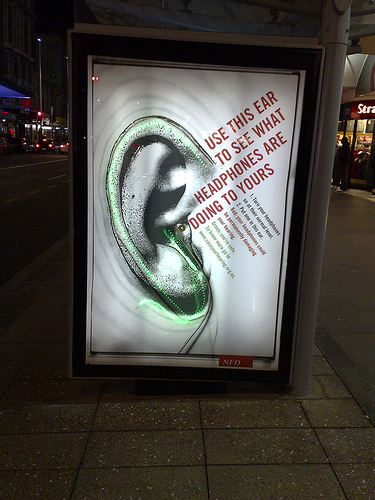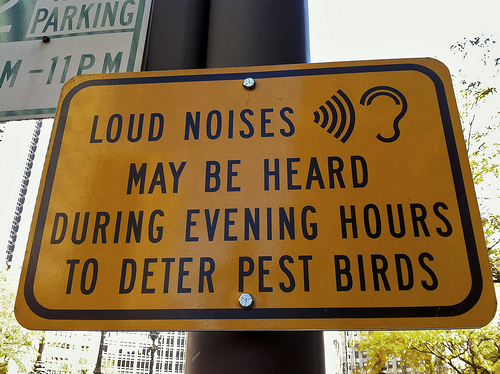The key to preventing tinnitus is to identify the causes of tinnitus and avoid them. This is easier said than done because there are so many causes of tinnitus (ringing ears). Moreover, not all of the causes are so easily avoided. Even so, when you consider that tinnitus can be extremely difficult to treat in people once they have acquired the symptom, any effort that you can make to prevent tinnitus is well worth your trouble.

Tinnitus and hearing loss
One of the more common causes of tinnitus is hearing loss, specifically sensorineural hearing loss. Sensorineural hearing loss is a form of deafness caused by a problem in the inner ear, namely the cochlea or the nerves that take electrical signals from the cochlea to the brain. For the most part, however, sensorineural hearing loss is due to a problem in the cochlea. The cochlea is a highly specialized sensory organ, which looks like a spiral conch shell (hence the name). The cochlea is filled with fluid that moves when disturbed by the eardrum and small bones of the middle ear. Sound waves traveling through the fluid of the cochlea move tiny hair cells inside the organ. When a hair cell moves, it sends a signal to the brain that is perceived as sound.

Hair cells are very delicate things. Sure each person is born with thousands of them in each cochlea (one cochlea in each inner ear), but hair cells are easily damaged by the ravages of life and time. Loud noises are particularly hard on hair cells, which is why people that are exposed to loud noise for prolonged periods of time lose the ability to hear later in life. As hair cells are damaged, hearing decreases and the brain is no longer satisfied with the lack of electrical input that results. Instead false neuronal sensations are perceived by the patient as sound.
Click Here for #1 Rated Tinnitus Treatment

Since sensorineural hearing loss goes hand in hand with tinnitus, it seems prudent to avoid the causes of both things, namely loud noises. Certain music concerts, motorized transportation, industrial and construction sites, and various other venues can bombard the ears with prolonged, damaging noise. It is important to wear ear protection, such as earplugs or earmuffs, when exposed to these environments. Hearing specialists predict that as young people that have grown up wearing headphones begin to reach middle age that we will see unprecedented levels of sensorineural hearing loss and tinnitus. If you are concerned about hearing, it is important keep the volume of music to a reasonable level.
Preventing medical causes of tinnitus
One of the best ways to prevent tinnitus is to keep your body as healthy as possible. While that is solid advice in general, it helps to prevent the medical causes of tinnitus. Various metabolic and hormonal problems can cause a ringing in the ears, from vitamin B12 deficiency to thyroid problems. While many of these health issues can be avoided by eating right and maintaining good physical health, regular visits to the physician are also important. Take thyroid disorders, for instance. Situations in which thyroid hormone levels in the blood are too high (hyperthyroidism) or too low (hypothyroidism) can manifest as tinnitus. These diseases may manifest in other ways as well, but slowly and in ways that may not be noticeable. Blood tests of thyroid hormone levels are routine but can only be performed by your doctor. High cholesterol and anemia are other examples of conditions that you may not feel but that can cause tinnitus and are usually only detected by history, physical examination, and blood tests.
Avoiding or managing drugs that can cause tinnitus
There are a number of prescription medications that can cause tinnitus. Some of those drugs are ones you might expect to be highly destructive, like medications to treat cancer. Other drugs that cause tinnitus are otherwise considered fairly safe. Some offending drugs can be avoided, but others are so commonly used that they might need to be “managed,” instead.
Chemotherapy, by design, destroys human tissue. Cancer tumors, after all, are collections of human cells that multiply rapidly and out of control. However, by introducing chemotherapy into the body, healthy human cells are also damaged in the process. One type of cell that is particularly sensitive to certain chemotherapeutics is the hair cell in the cochlea of the ear. As cancer-killed drugs course through the body, some of it ends up in the ear and may harm hair cells. This can lead to hearing loss and tinnitus. Not all chemotherapeutics are harmful to the ears; when making clinical decisions, oncologists weigh the side effects of medications against their ability to fight cancer. It is important to discuss these issues with your oncologist, especially if you are particularly prone to hearing problems.
Patients with cancer generally have to make some concessions when receiving treatment for such a difficult disease, but patients expect that antibiotics and pain medicines (especially over the counter pain medicines!) are safe. This is why it is often shocking for people to discover that these commonly used and prescribed drugs can lead to ototoxicity (ear damage) and tinnitus. There are documented cases in which the antibiotics erythromycin, chloramphenicol, tetracycline, and vancomycin have caused tinnitus in patients. Fortunately erythromycin is rarely used anymore, if at all. Chloramphenicol and tetracycline are still used, though sparingly. For these three medicines, the risk of ear problems may be eliminated by simply avoiding them. However, with the rise of antibiotic resistance in bacteria, vancomycin is widely and increasingly used. For vancomycin, avoiding tinnitus comes by keeping the doses to a minimum and spreading out doses as much as possible. These same strategies (low doses, spread out over time) can be applied to other classes of potentially ototoxic drugs.
Millions of patients rely on both NSAIDs and diuretics (loop diuretics) daily basis. People with chronic pain, especially from arthritis, take NSAIDs in fairly high doses just to make it through the day. Loop diuretics are the mainstay of therapy in patients with congestive heart failure and are needed to keep excess fluid from accumulating in the body. In these cases it may not be possible or realistic to avoid these drugs, but it is possible to optimize treatment and keep doses as low as possible. Ask your doctor about alternative treatments for chronic pain. For congestive heart failure, sticking to the prescribed diet and following other medical instructions can keep the daily dose of Lasix fairly low. What is more, properly managing congestive heart failure can reduce exacerbations of the disease and avoid hospitalization. Hospital stays pose true tinnitus risk since very high doses of intravenous loop diuretics are given to reign in the heart failure during hospitalization.
When possible, it is also helpful to only take one ototoxic drug at once—taking multiple offending agents increases the overall risk of tinnitus. You may also request periodic hearing (audiological) testing to catch any problems early. If the tests show hearing loss, the drug or drugs that are causing the ear problems can be stopped or reduced before further damage can occur.
Click Here For Highest Rated Tinnitus Treatment
1. Tinnitus Miracle - www.TinnitusMiracle.com
2. Tinnitus Control - www.TinnitusControl.com
3. Tinnitus Cure - www.TinnitusCure.com
 Our surprise pick is an all natural solution that you can use to get relief from Tinnitus.
Our surprise pick is an all natural solution that you can use to get relief from Tinnitus.